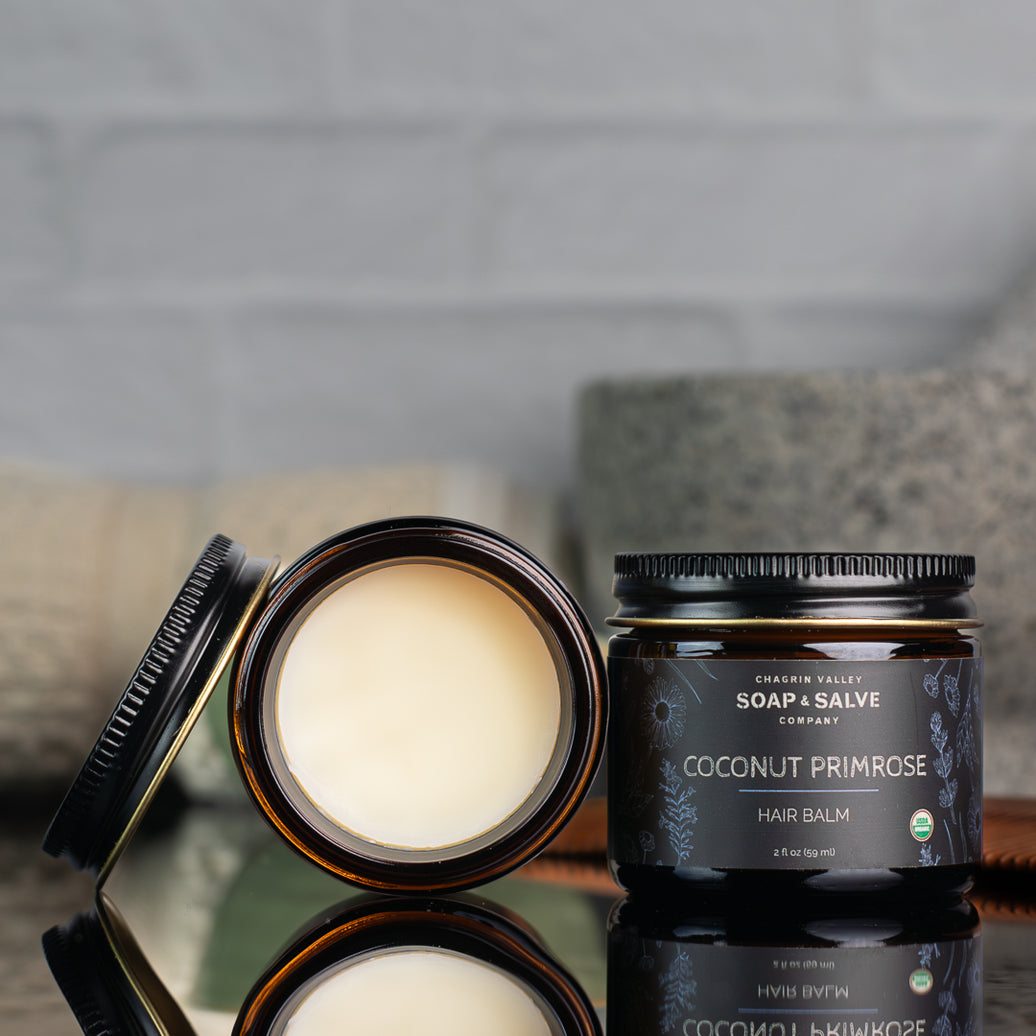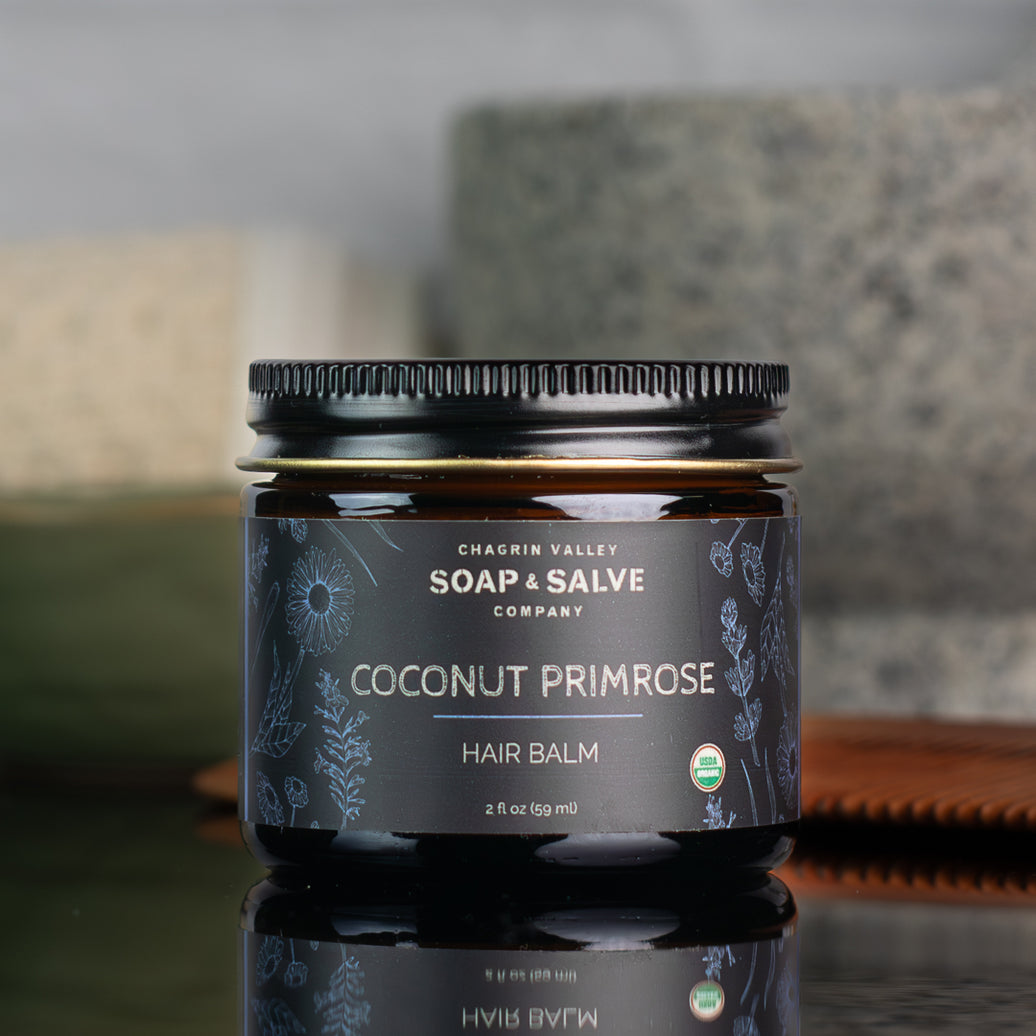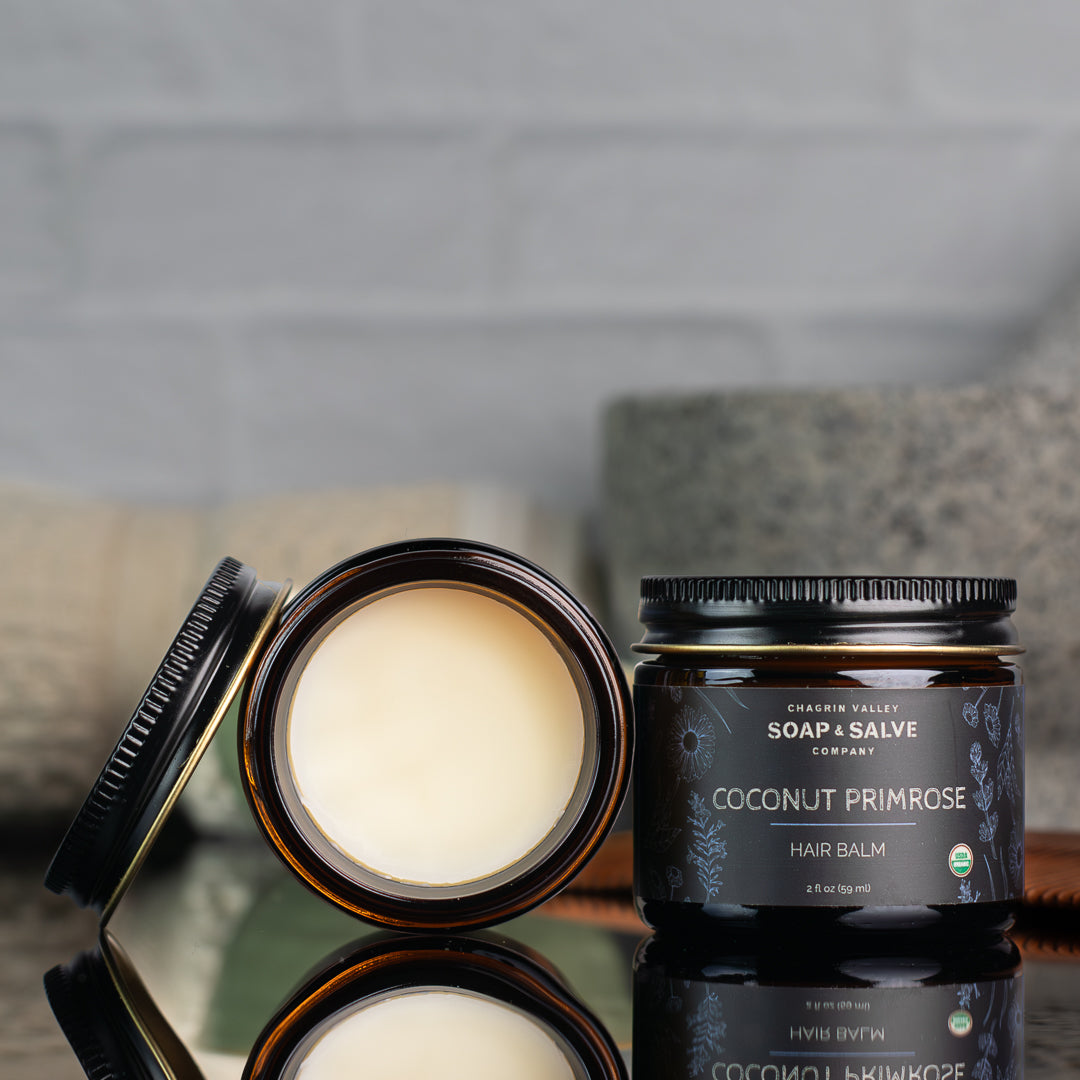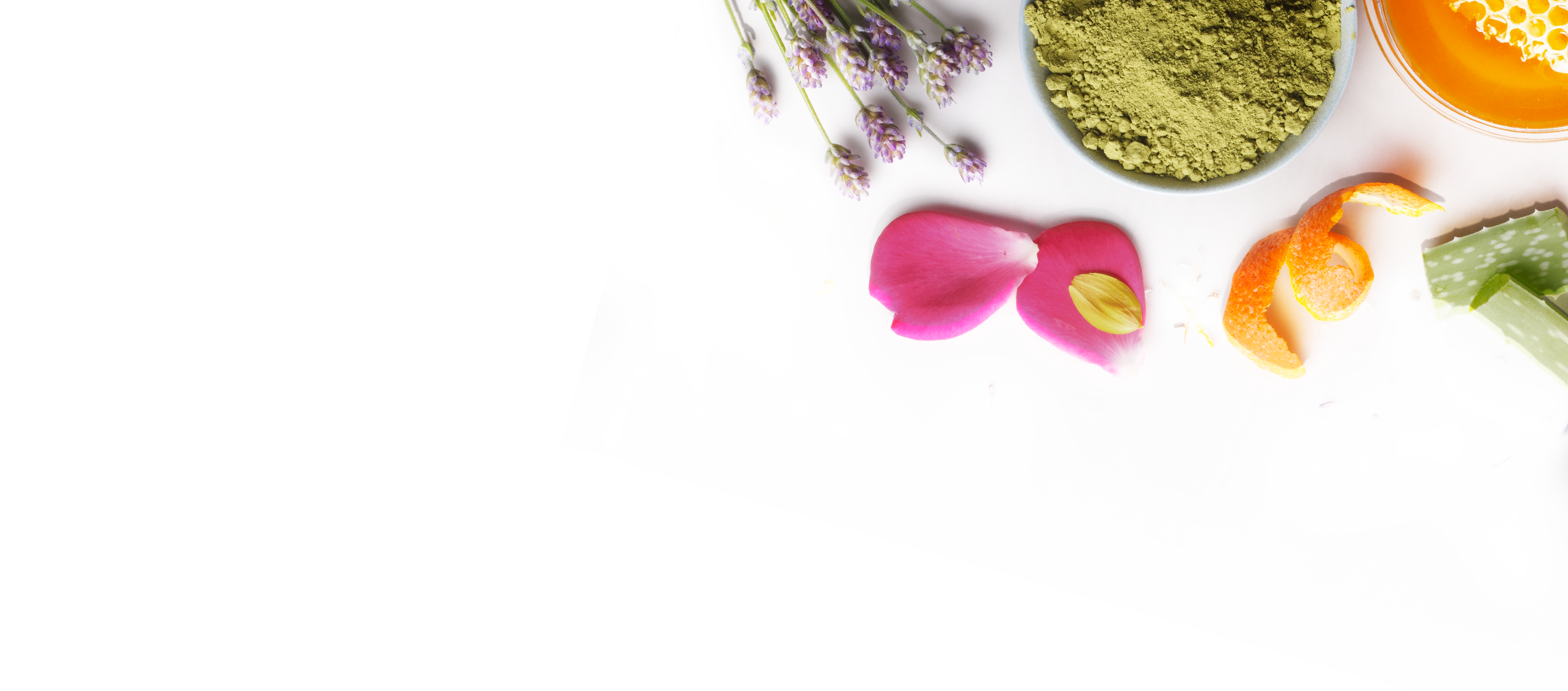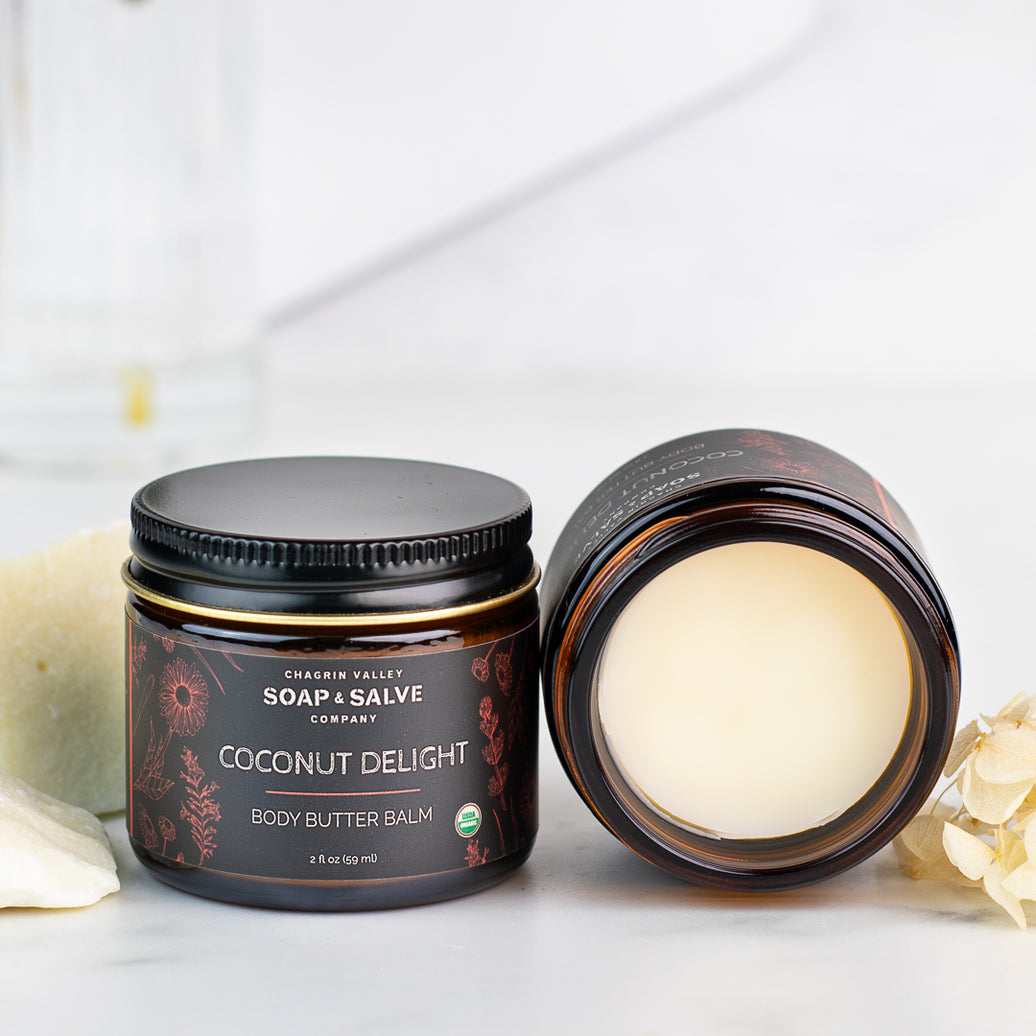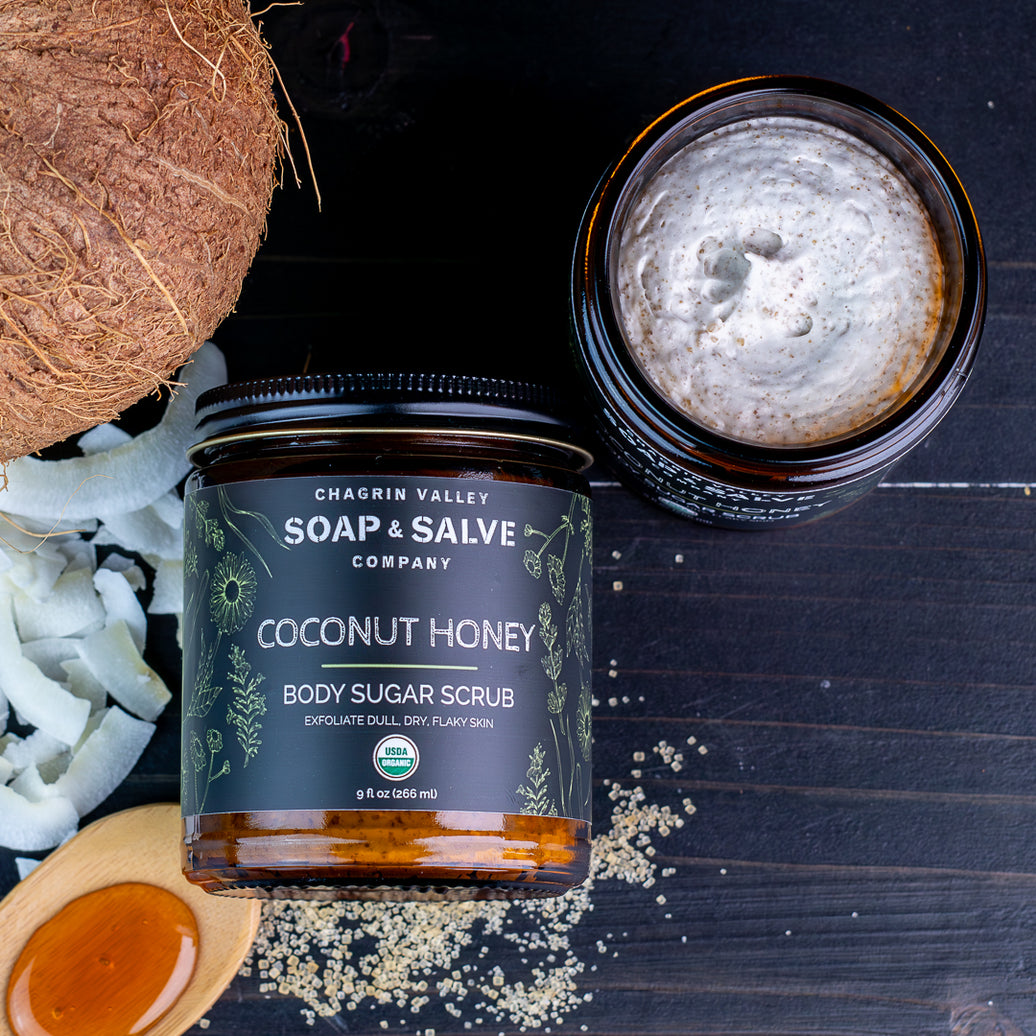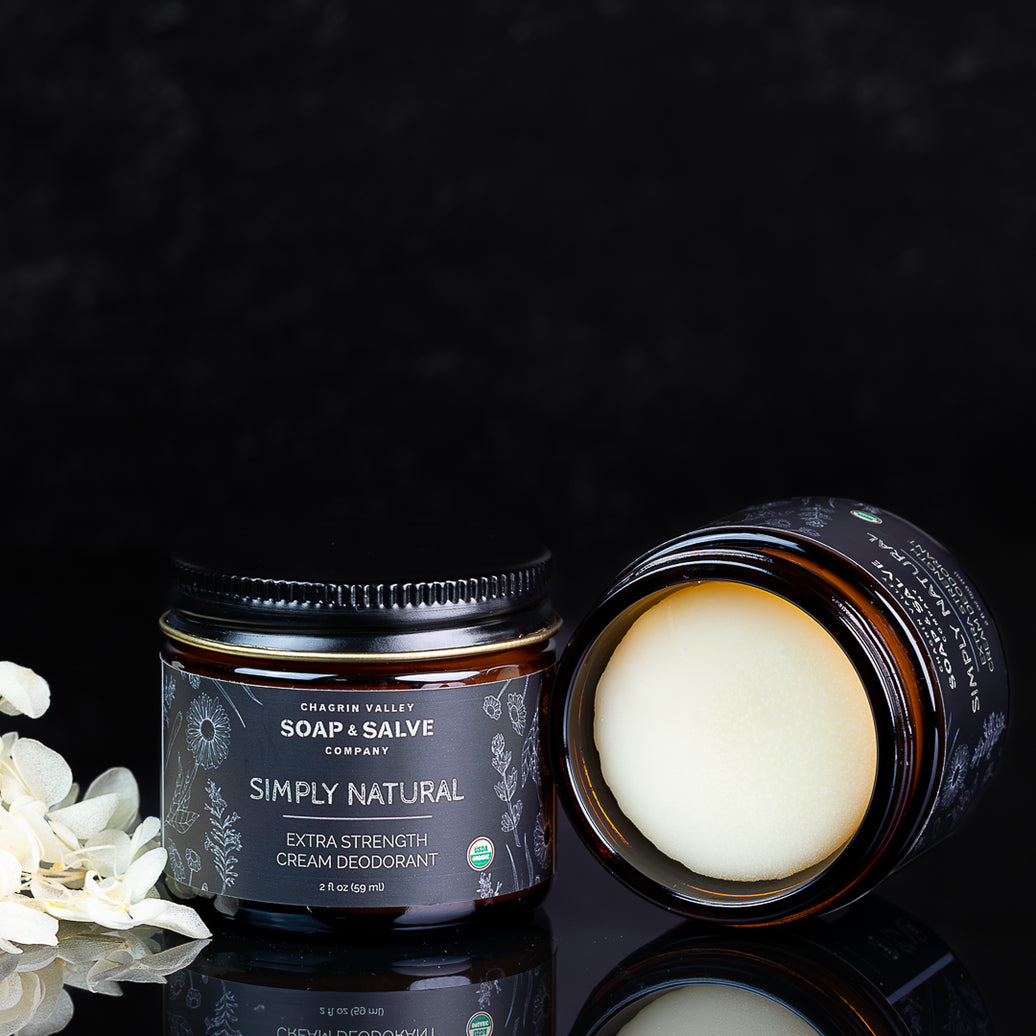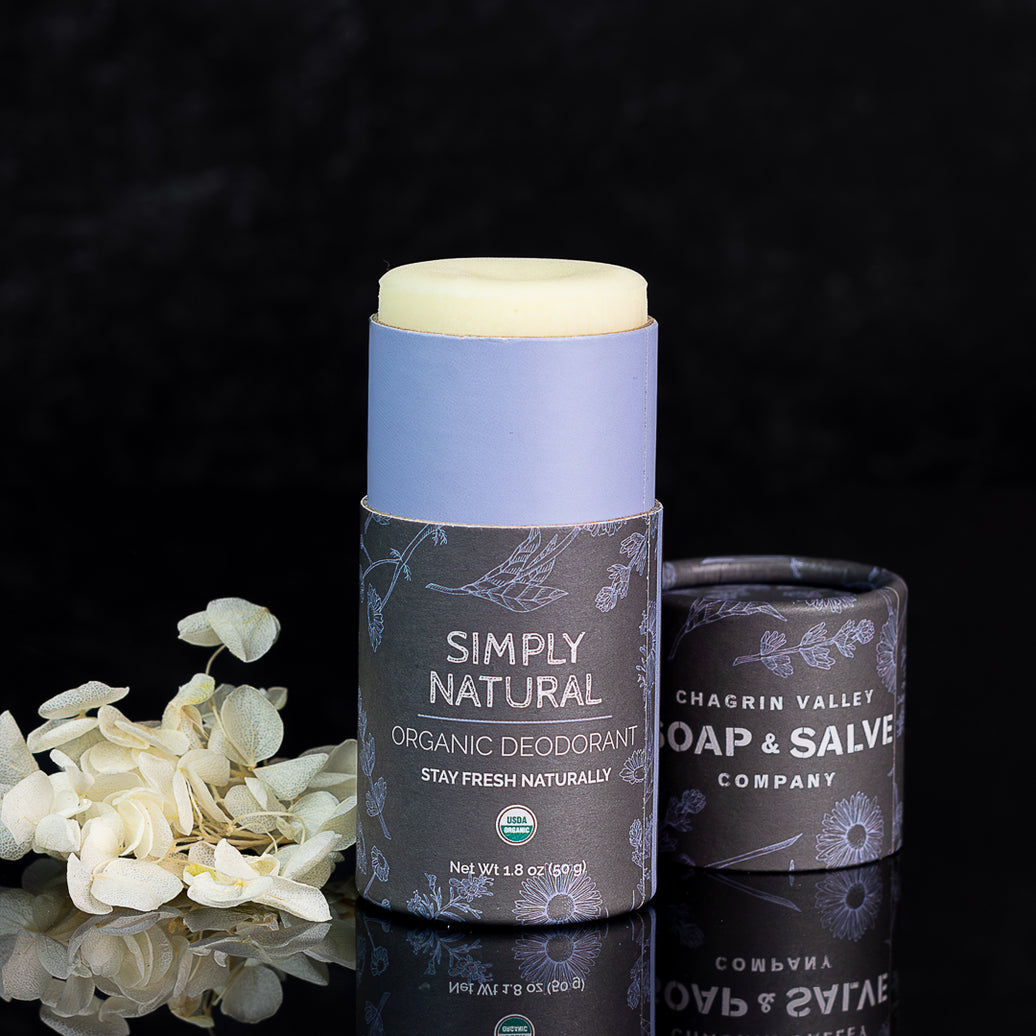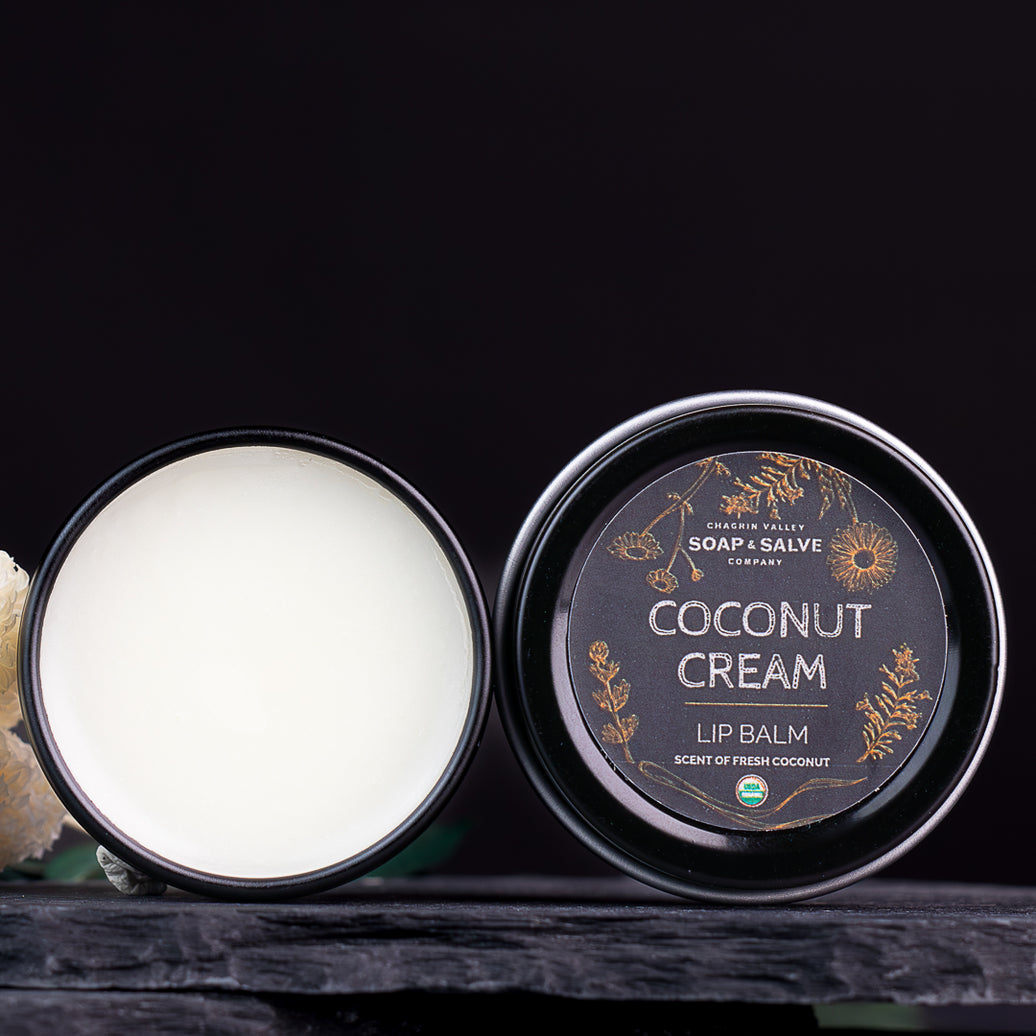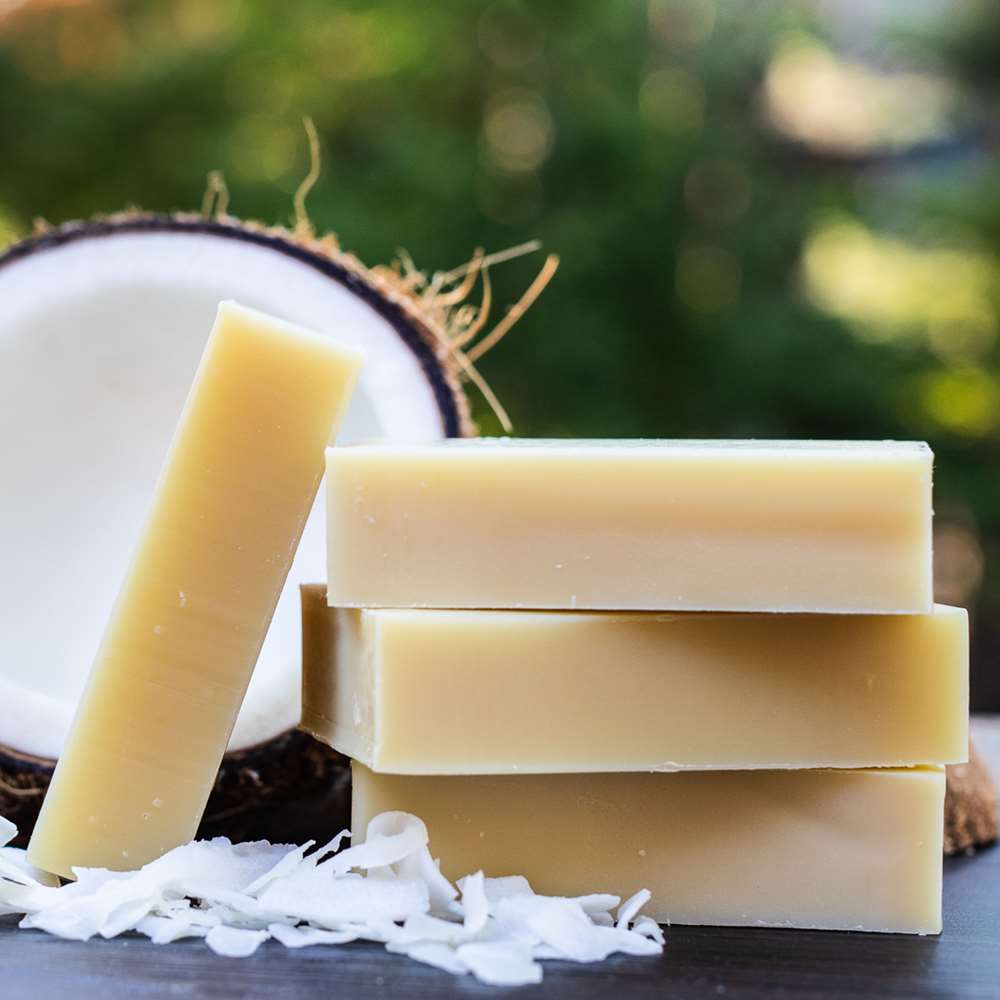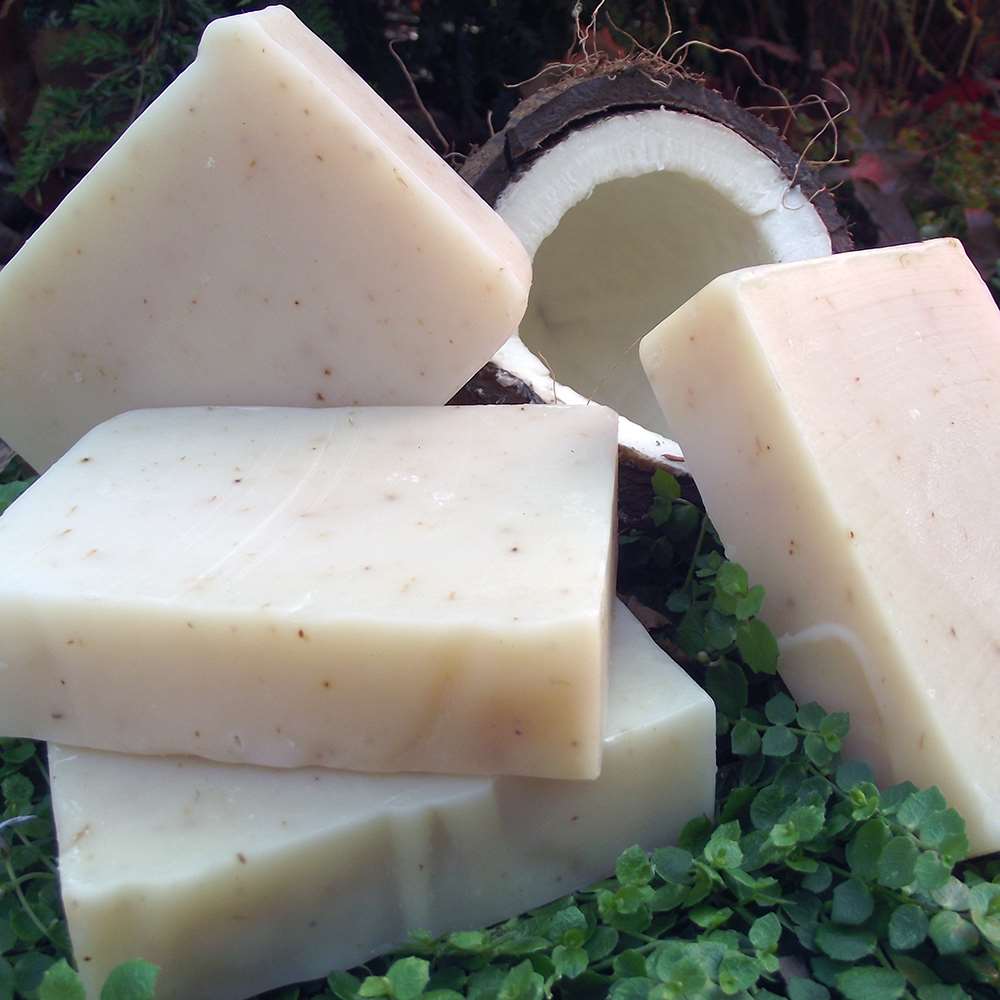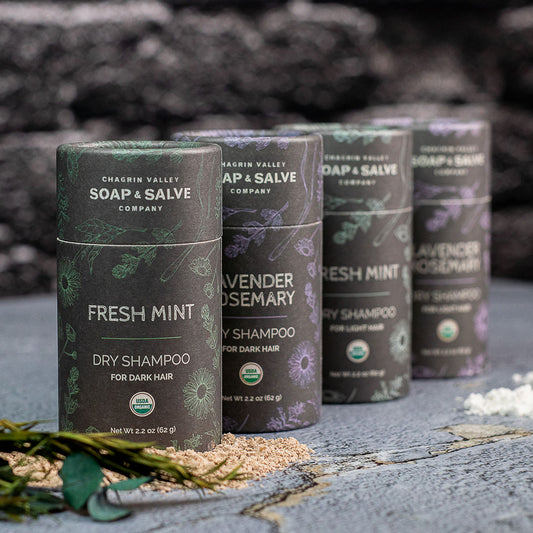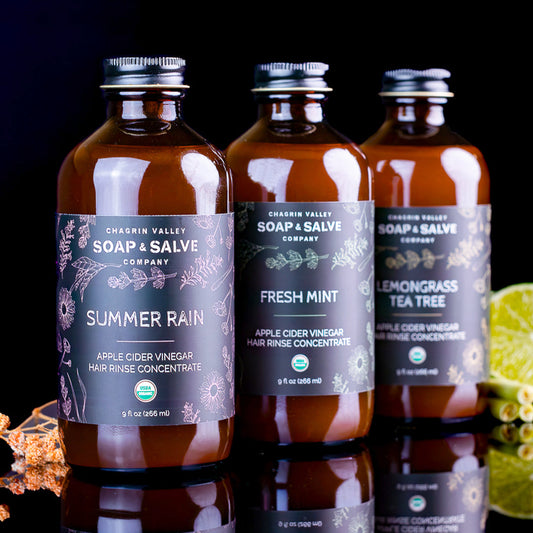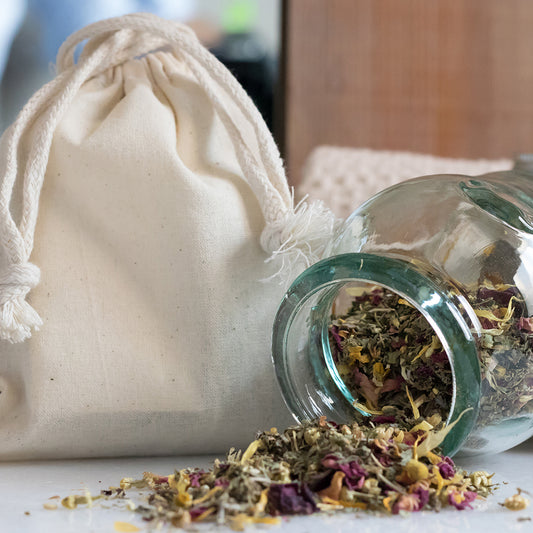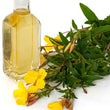
Hair Balm: Coconut Primrose
Hair Balm: Coconut Primrose
Coconut oil, a great natural moisturizer for the scalp and hair, nourishes dry and brittle hair, encourages healthy hair growth and promotes a healthy scalp.
- Out Of Stock






Product Overview
Good For: Natural, Medium, Coarse, or Curly Hair
Hair butter balms are very versatile products that can be used as pre-wash conditioners, in-shower conditioners, intense conditioners, and leave-in conditioners.
Coconut Primrose, our lightest hair balm, conditions and moisturizes naturally medium-to-coarse hair, tightly coiled curly hair, grey wiry hair, dry brittle hair, over-processed hair, damaged hair, or any hair that is prone to frizz, flyaways, or breakage.
Coconut oil, a great natural moisturizer for the scalp and hair, nourishes dry and brittle hair, encourages healthy hair growth. Coconut oil easily penetrates hair strands and provides deep conditioning. The fatty acids in coconut oil help condition and soften hair. If you have split or dry ends, dab a bit of balm on the ends and use it as a leave-in conditioner. Moreover, it helps hydrate the hair and tames the frizziness. This is particularly helpful for those who have curly or wavy hair that tends to get drier, and eventually, endures hair breakage.
Evening Primrose Oil helps hydrate and nourish the scalp to fortify the strands and soothe itchiness, dryness, and inflammation which may help prevent breakage and reduce hair loss. It is rich in antioxidants and fatty acids which provide nourishment to the scalp. A rich source of fatty acids, evening primrose oil promotes blood flow, hydrates, flattens the hair cuticle and helps clear clogged pores, which in turn reduces hair loss.
Since the structure of Jojoba Oil closely resembles that of our own natural scalp oils, it is considered nature's most effective natural moisturizer. It improves the health of the scalp and hair, provides shine, promotes hair growth, and helps dry and weak hair that is prone to breakage and split ends. It is a great oil for dry, flaky scalp and irritated scalp conditions.
How To Use
The most important thing about using a hair balm is to make sure it is distributed evenly. Sectioning your hair into layers, a top and bottom layer, can make distribution easier. The thicker or coarser your hair the more layers you may need.
To allow better absorption and maximize its hydrating effects, use hair butter on damp or moist hair.
When applying a hair butter, focus on areas that need extra TLC like the hair ends since they are far from the scalp and lack natural oils.
Basic Instructions:
- Can be used on dry or moist hair.
- Place a small tiny pea size amount of balm into your palms and rub your palms and fingers together.
- Rake your hands and fingers through your hair length like a comb to evenly distribute the oil through to the ends.
- If hair is sectioned, follow the same procedure for each layer.
Deep Conditioning Treatment or As a Hair Mask
Use it as a pre-shampoo, deep conditioning treatment once or twice a week depending on your hair type. Your hair will become softer and easier to manage.
- Wet your hair
- Follow the basic instructions above
- Focus on the hair ends
- Wrap buttered hair in a shower cap
- Leave it on for 30 to 60 minutes
- Wash with a mild shampoo and style as usual
- If you have damaged or very dry, coarse hair, leave the mask on overnight and wash off the next day
Tip: Any time you are leaving the butter balm on your hair, cover your hair with a shower cap. A shower cap keeps your head warm, preventing the butter drying out on your hair strands.
Cream Hair Butter as an In-Shower Conditioner
Method 1: After a shampoo and rinse, squeeze excess water out of your hair. Then apply the balm directly to your damp hair using the basic method above and let it sit for 10 minutes while you complete the rest of your shower. Rinse and towel dry.
Method 2 for a lighter weight application: After a shampoo and rinse, squeeze excess water out of your hair.
- Prepare the Butter: Using a small spoon (to prevent water from entering the jar), scoop a pea-sized amount of butter (to avoid over-application) into your shower wet palm. You may want to use more or less based on hair length or type.
- Emulsify: Swirl the butter with your index finger for a few seconds, mixing it with the water already in your damp palm, until it becomes lotion-like.
- Apply: Rub your fingertips into the balm, then rake your fingers evenly through your damp hair length, like a comb, to evenly distribute the butter from mid-length to ends. Experiment with application points to find what works best for your hair.
- Allow the balm to remain on your hair for a few minutes while you complete the rest of your shower.
- Rinse a bit and towel dry as usual.
As A Leave-In Conditioner
Use as a leave in conditioner after shampooing to help prevent split ends, calm frizz and flyaways and add a healthy shine. Place a small amount of balm in the palm of your hand, rub palms together and scrunch into damp hair ends or smooth from mid-length to the hair ends. Comb thoroughly to evenly distribute the butter. Do not wash. Style as usual.
Use as a pomade butter to touch up problem spots. Rub a tiny bit of hair butter in your palms, apply to clean, dry hair to smooth down coarse or wiry flyaway hair strands, giving hair a healthy sheen.
Should You Oil or Cream The Scalp?
For most people it is recommended to avoid applying oils or butters to the scalp. So when using a hair butter begin at least about three inches from the scalp and work all the way to the ends.
Whether or not to oil your scalp seems to be up for debate. While many articles encourage applying oil directly to your scalp, others state that applying oil directly on your scalp may put you at higher risk for dandruff. But some people with dry hair also have a dry scalp. If you typically oil your scalp without any problems then continue to do what your hair and scalp like.
For Dry Scalp: Using your fingertips gently massage a small amount of hair balm into your scalp. The massaging action aids in the absorption. Leave on for at least 15 minutes and then wash and style as usual.
Helpful Hints
- When using a hair butter balm more is NOT better. Too much conditioning cream can weigh your hair down, cause excess buildup, and give hair a greasy look and feel.
- Be sure to wash your hair to remove the residue from a previous application before applying more hair cream.
- Combining a hair butter with other hair products like mousses and gels may cause heavy buildup and greasiness.
Learn more: Read "What is Your Hair Type?"
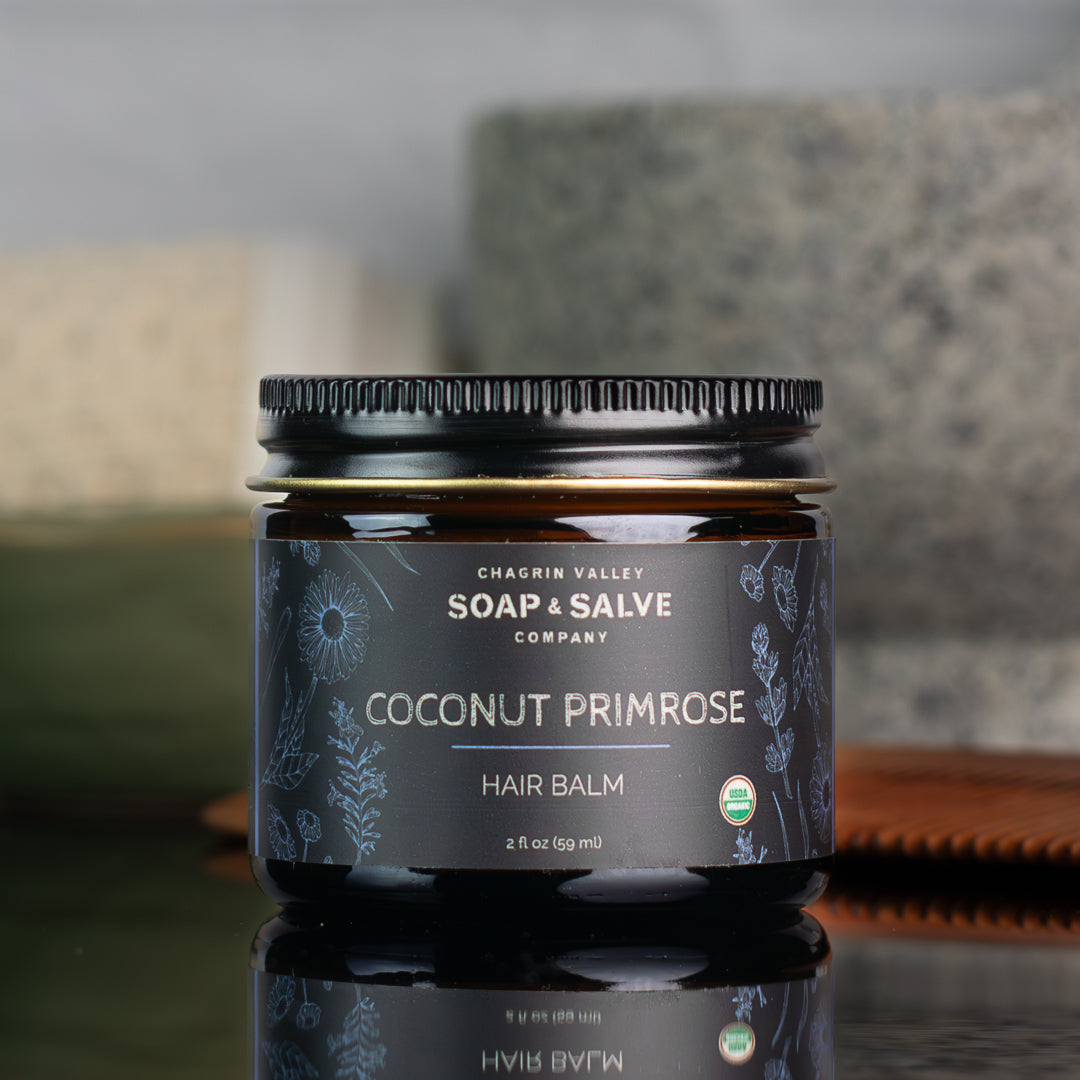
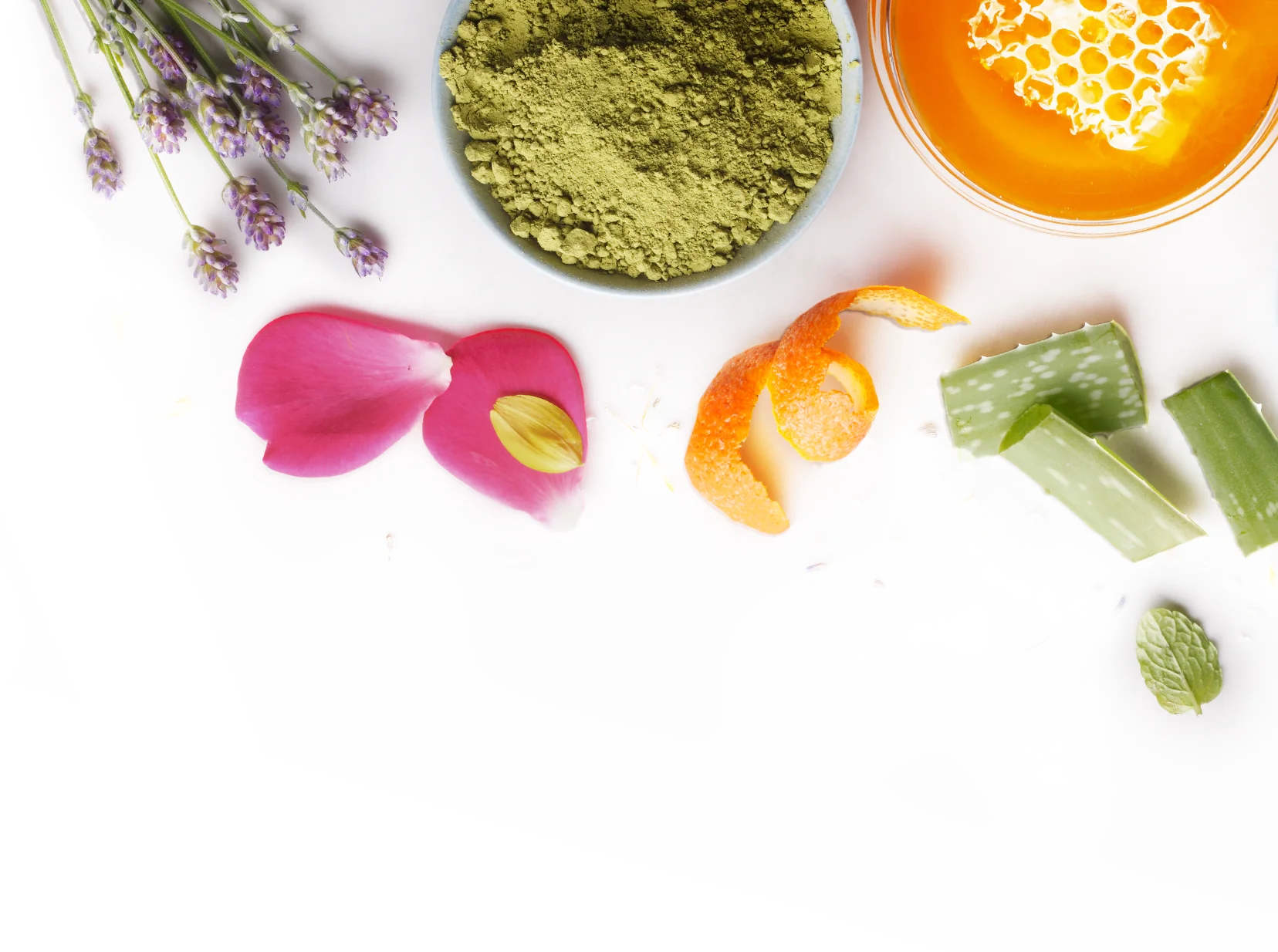
Effective, Feel Good Ingredients
The goal is simple: to Harness the Power & Simplicity of Nature® to cleanse, soothe, heal, and protect your skin and hair!
Our unique formulas rely on moisturizing oils and butters, healing botanicals, and pure essential oils. We choose every ingredient with one end-result in mind….the BEST possible natural skin care for YOU!
Featured Ingredients

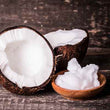
Organic Virgin Coconut Oil*
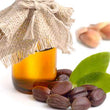
Organic Jojoba Oil
All Ingredients:
Frequently Asked Questions
What Is Your Hair Type?
What Is Your Hair Type?
In my youth I had pin-straight hair and was envious of friends with wavy and curly hair. But those friends were jealous of my straight hair! Whether your hair type is straight, wavy, curly, coily, or somewhere in between, your locks are beautiful.
In the same way that understanding your skin type is important for creating an effective skincare routine, determining your hair type can play a huge role in helping you to reach your hair goals.
Hair type has 4 major categories: straight hair (type 1), wavy hair (type 2), curly hair (type 3), and coily hair (type 4). These 4 types of hair are further categorized into A, B, and C subtypes creating 12 total categories.

The best way to determine your hair type is to see your hair in its natural state. By simply looking at your hair you can recognize some obvious characteristics. The next time you wash your hair, allow it to air-dry without any styling or hair products. This will help you to define the natural shape or pattern (texture) of your hair. For example:
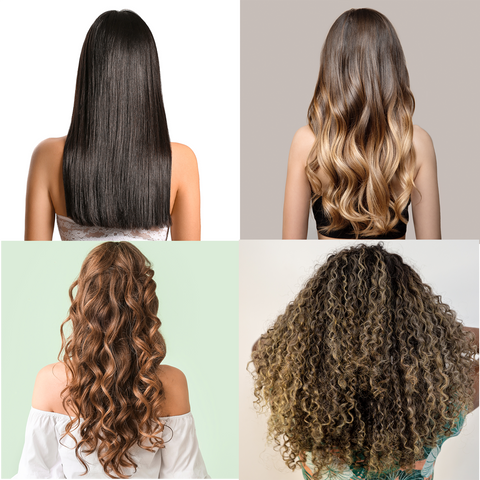
- If your hair dries straight without a bend or curl, then you have straight hair (type 1).
- If your hair dries with a slight curve or “S” shape, then you have wavy hair (type 2).
- If your hair dries with a defined curl, then you have curly hair (type 3). This type of curly hair has springy ringlets or corkscrew curl patterns but is not as dense as coily hair.
- If as your hair dries it shrinks to form tight curls or dense spirals, then you have coily hair (type 4) which is often called a "natural" hair type. This hair type is more fragile and prone to breakage than others, requiring a more specialized hair care routine.
It is important to remember that most people do not have just one type of hair. They often have two different hair textures on various parts of their head.
Each of these hair textures will need special care and attention to enhance its natural best characteristics. Also, even though two people share the same natural wave, it does not mean they possess the same exact hair type. You are unique!
What Is the Density and Thickness of Your Hair?
The words "thick" and "thin" can be confusing since you can have a lot of very thin hair and vice versa.
The density is the thickness or diameter of an individual hair strand. To determine your hair density use a single strand hair and compare it to the size of a piece of typical sewing thread. Fine hair is thinner than the thread, medium hair is similar in width, and coarse hair is wider. Hair density can affect how it will react to certain products and how well it will hold different hairstyles. There are 3 basic categories:
- Thin or fine
- Medium
- Thick or coarse
Thin hair does not style very easily. Medium hair is relatively easy to style and can hold curls for a longer time period. Thicker strands are very easy to curl, but because they are less pliable, they can be difficult to style or hold their shape.
Overall thickness refers to the total amount of hair on your scalp, which can range from thin to thick. When you gather your hair into a ponytail how much hair can you collect?
What Is Hair Porosity?
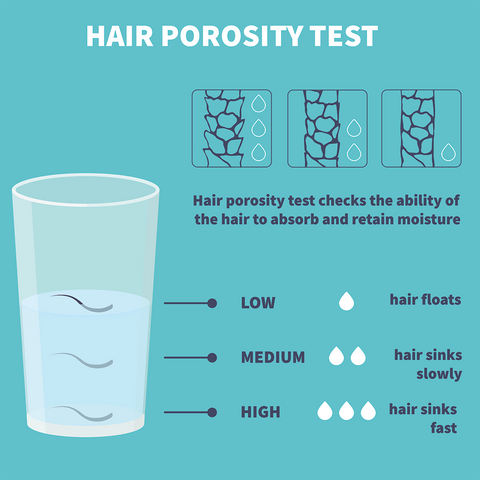 Porosity refers to your hair’s ability to absorb moisture as well as hair products. You can easily determine the porosity of your hair with a simple experiment.
Porosity refers to your hair’s ability to absorb moisture as well as hair products. You can easily determine the porosity of your hair with a simple experiment.
- Place a single strand of hair into a bowl of water.
- Does the strand sink to the bottom? If yes, it has high porosity, which means it is soaking up a lot of moisture due to gaps or tears around the cuticle.
- Does the strand sink, but only a bit? If yes, your hair is absorbing just enough moisture to keep it healthy and well-balanced.
- Does the strand float above the surface of the water? If yes, your hair has low porosity, which means it does not absorb moisture easily.
It seems like hair with high porosity would be well hydrated all the time since it can easily absorb moisture easily. However, due to the gap areas around the cuticle, the hair also loses moisture very easily, which can result in hair that is dry, brittle, frizzy, and prone to breakage.
On the other hand, that flattened cuticles of hair with a low porosity actually blocks moisture from being absorbed into the strands. Since hair care products are not readily absorbed, product buildup on hair strands is often a problem. Hair care products should be applied sparingly while hair is still damp so product is more easily absorbed and distributed.
To keep your hair healthy and nourished, it is important to develop a haircare routine that includes proper hydration. Knowing your hair type is crucial, as it helps you choose the right products for straight, wavy, curly, or coily/kinky hair.
View Answer Page
How To Use Apple Cider Vinegar Hair Rinse Concentrate
How To Use Apple Cider Vinegar Hair Rinse Concentrate
Directions For Whole Head Rinse: NEVER use undiluted Vinegar on your hair. Our hair rinse is pure ACV and must be diluted.
The typical suggested dilution is five parts water to one part vinegar. Which is about 1.5 tablespoons (22 ml) of AVC concentrate to 8 ounces (237 ml) of water. However each person's hair is unique.
Organic, raw, non-pasteurized vinegar appears cloudy with sediment on the bottom due to the “mother” which contains the natural living enzymes and nutrients.
- Since we use raw vinegar with natural "mother," please shake our ACV concentrate before use
- Add 8 ounces (237 ml) of warm water to Squeeze Bottle, Spray Bottle, or measuring cup*
- Add 1/2 - 2 Tablespoons (7.4 to 30 ml) of Herbal Vinegar and mix**
- Pour or spray through wet hair after shampooing
- Take care to avoid eyes
- Massage into hair and scalp, paying attention to ends
- Let sit for a couple of minutes
- Rinse it out thoroughly with cool water to help seal your hair’s cuticle***
- Towel dry
- The vinegar scent will disappear as the hair dries
- For long thick hair, the recipe can be doubled
- For short thin hair, the recipe can be halved
*Container Type: I find that using a squeeze bottle or spray bottle requires a lot less vinegar rinse than pouring the rinse on your head from a measuring cup. I have long, fine hair, and one 8-ounce recipe mix will last me for 3 to 4 rinses. The premixed vinegar solution will last for about a week without refrigeration.
**Concentration Note:
- I have seen way too many websites that provide the "ideal" dilution amounts for ACV and water. My question is "ideal" for whom? You will need to experiment to find a dilution that works best for your hair type. Typically a dry scalp likes less ACV and oily scalp likes more.
- We provide a range of 1/2 to 4 tablespoons of apple cider vinegar (ACV) with 8 ounces (1 cup) of water since we all have different hair types.
- We suggest you begin with 1/2 tablespoon of ACV to 8 ounces of water in order to judge how your hair and scalp will feel. I find that using 4 tablespoons (1/4 cup) ACV to 8 ounces (1 cup) of water is too concentrated for most.
***Rinse or Not Rinse: Some people find that they obtain better conditioning and detangling if they don't rinse all of the ACV out of their hair. Just remember that ACV is quite acidic and again you will have to judge for your own hair and scalp.
If you have very sensitive skin or are simply trying a new product for the first time, we always recommend doing a patch test.
For external use only. Discontinue use if irritation occurs. Best if used within 6 months of opening.
Common Questions
Is an ACV Rinse Safe for My Hair?
When using the proper dilution, apple cider vinegar is generally safe for all hair types. It is especially beneficial for those with major product buildup, whether from excess grease, styling products, or lots of dry shampoo.
Folks with oily hair types can often use a higher concentration of ACV, but if you have dry hair, we recommend using a greater concentration of WATER to ACV to avoid drying out your hair and scalp.
How Often Can I Use an Apple Cider Vinegar Hair Rinse?
Since everyone's hair is unique you should use your own judgment on this. You will need to experiment to find a dilution that works best for your hair type. Remember--dry hair likes less vinegar and oily hair likes more.
Some say that vinegar rinses may be drying if used every day and it is best to restrict use to two times per week. I used a vinegar rinse every other day for the first few weeks when I switched to natural shampoo bars until my hair adjusted to the new shampoo. I now have that typical somewhat wiry gray hair and I find that using a very dilute ACV rinse every one to two weeks helps keep my hair healthy and shiny. Many customers have found this regimen to work, but do some experimenting!
Do I Still Need To Use Conditioner?
There is no "yes or no" answer to this question. I have long, thin hair and have found that after using our vinegar rinse my hair is tangle-free and after drying it has more body and shine than when I used conditioner. So I would say that you do not need a conditioner.
But you must experiment. If you normally need conditioner and you discover that the lack of conditioner affects the appearance of your hair, I would suggest applying conditioner sparingly to the ends of your hair.
Are Vinegar Rinses Safe For Color Treated Hair?
The information concerning the effect of vinegar rinses on color-treated hair runs the gamut from one extreme to the other. On one hand, some folks say that the acidic pH of vinegar will strip some color from color-treated hair.
On the other extreme some believe that since vinegar seals the hair cuticle it can actually help prevent color from fading.
Still others say that a dilute vinegar rinse once or twice a month will freshen highlights and enhance shine as it removes residue that has accumulated on the hair shaft. If you are unsure I suggest doing a "strand test" on hair strands that are hidden when you style your hair.
Some Benefits of an ACV Rinse
- clarifies as it conditions the hair and scalp
- removes residue
- brings back body, bounce, and shine
- smooths frizzy hair
- revitalizes dull hair
- stimulates scalp circulation
- helps decrease dandruff
- unclogs hair follicles which may help with excess shedding or hair loss
An apple cider vinegar hair rinse benefits your hair and scalp and is a wonderful addition to any hair care regimen. It can also be very helpful for those who chose to use Natural Shampoo Bars. Support the health and beauty of your hair by using natural shampoo bars and an ACV rinse and your hair will shine with thanks!
Learn More Blog: "Apple Cider Vinegar Hair Rinse Benefits & How to Use Them"
View Answer Page
Are Chagrin Valley Ingredients & Products USDA Certified Organic?
Chagrin Valley Soap & Salve is a USDA Certified Organic Company

The most important consideration in any business is its customers. Today's world of misleading claims, false advertising, and simple deception, often leaves consumers trying to discover the truth about personal products and their ingredients.
- We want our customers to know that we are committed to transparency in everything we do.
- We want our customers to know that when we say "organic," we mean it.
- We believe that in becoming a USDA Certified Organic company, our customers do not have to wonder if we really use certified organic ingredients or if our organic products are truly organic.
- So we choose to be a certified organic company and abide by the strict standards required for organic certification.
Some of my favorite products are made with ingredients that just do not exist as certified organic. Why? At this time there are no standards created for ingredients specifically used in the personal care product industry. Organic certification of personal care products is based on the organic food standards set by the National Organic Program of the USDA.
But since we are a certified organic company, we are required to submit documentation that even our "non-organic ingredients" were produced without the use of toxic pesticides, genetically modified organisms (GMOs), sewage sludge, or irradiation.

Why Did We Become a Certified Organic Company?
What Do All of the Organic Labels Mean?
View Answer Page
What If My Natural Skincare Product Melts in Warm Weather?
Why Do Some Products Melt in Warm Weather?
We do not use synthetic stabilizers or waxes, so our delicate natural products packaged in glass jars and metal tins are sensitive to temperature changes.
While shipping during warm weather seasons presents a real challenge to our natural skin care company, we accept the challenge in order to maintain our standard of natural and nourishing skin care. We hope you agree.
During warm weather, products may soften or even melt as they sit in warm mail trucks, mailboxes, or on front porches.
The quality and healing properties of our products are not affected by melting.
On very sunny or warm days, BEFORE opening the jars or tins, place the items in your refrigerator for a few hours to allow them to harden, just in case they have melted in transit. If you open items, especially those in tins, to check if melting has occurred, they may spill and make a mess!
What To Do About Melting
Cream Deodorants
If you think that your balm-like deodorant is melted or runny, BEFORE opening the jar, pop it in the freezer for 10 - 15 minutes. As it begins to harden give it a stir (so that the solids do not sink to the bottom) and place it back in the freezer until firm!
Sometimes a cream deodorant can melt during warm transit and then slowly re-solidify before you receive it. This melting and slow cooling can result in a grainy feeling. If your deodorant feels grainy, simply melt it, mix thoroughly, and place it in the refrigerator until solid.
Since the stick deodorant are made with more beeswax, they are less sensitive to an increase in outside temperature.
Whipped Body Butters
Place a melted body butter in the refrigerator until firm.
Our hand-whipped process adds tiny air bubbles that increase the volume, just like whipping cream. If a whipped product melts, the air bubbles collapse and the volume is decreased.
So, although the jar was filled to the top initially, there will be less volume in the container (since it has deflated) and the container may actually look half full.
After cooling a melted Whipped Butter will be the consistency of our body balm and is still a great moisturizer.
Sugar Scrubs
If a Sugar Scrub melts, the oil may separate out a bit. Give it a good mix and place it in the refrigerator for about 10 to 15 minutes. As it begins to harden up give it another stir to disperse the sugars and place it back in the refrigerator. Once it's solidified and mixed it will be great to use! Again because it is a whipped product, the container may have less volume when the whipped butters melt.
Read more about melting products and what to do in our blog "Natural Skin Care Products Melt In Hot Weather."
View Answer Page
